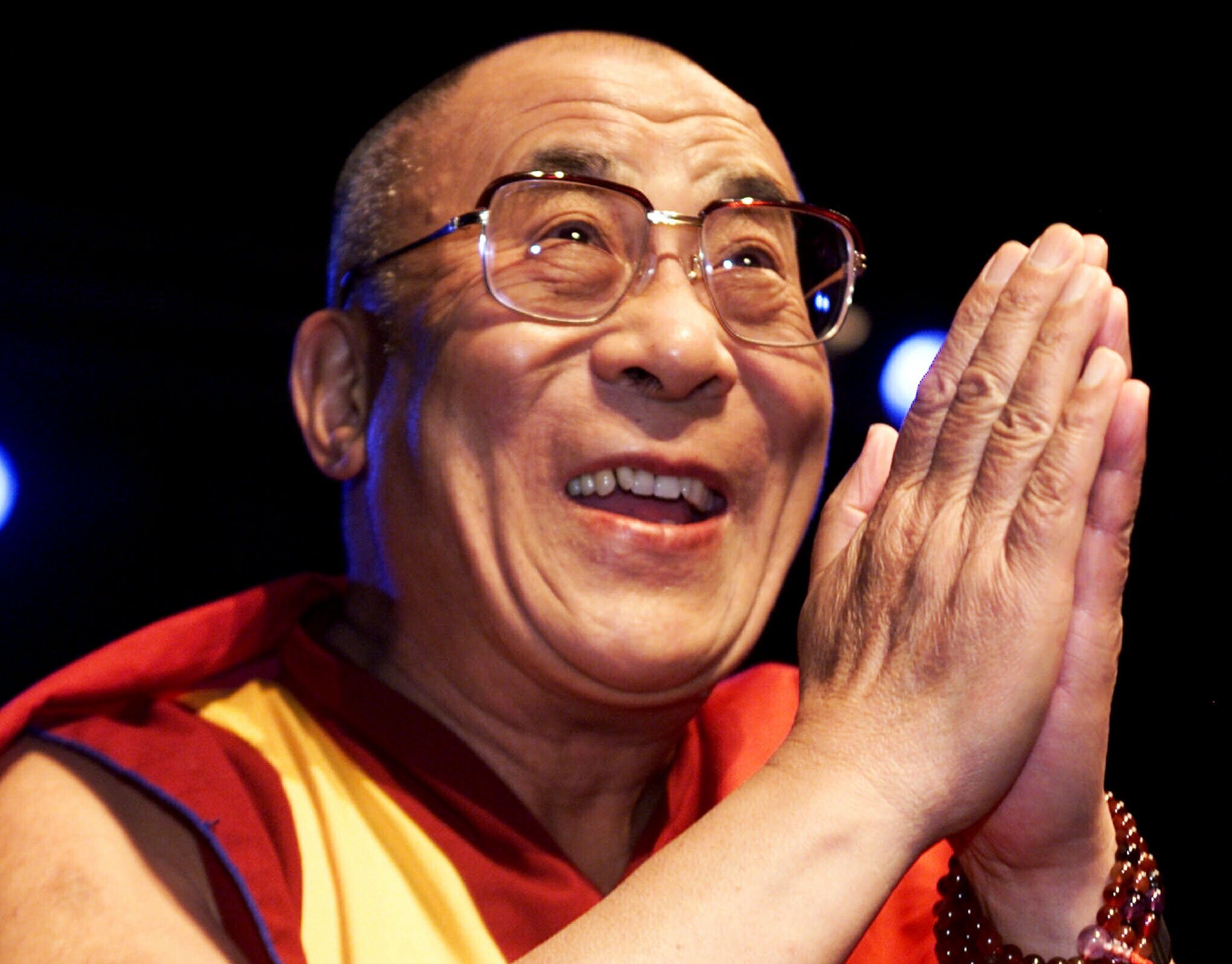My Day with the Dalai Lama; A primer for happiness
The Dalai Lama smiled as he shook his head. There is no difference between the East and the West, he said. Everyone has the same “mind,” so every person has the chance to gain enlightenment – the ability to live a joyful life. He was sitting in a packed ballroom, talking to a group of American researchers investigating the scientific underpinnings of compassion.
Every spring, I attend the Meditation and Psychotherapy Conference at Harvard Medical School. To my delight, this year’s keynote speaker was to be His Holiness, the 14th Dalai Lama, Tenzin Gyatso, the exiled leader of Tibet, who is considered a “living Buddha.” I saw this as the chance of a lifetime. After all, I was going to spend the day with the Dalai Lama, a man who has dedicated his life to understanding the “big questions” of existence.
In 1959, during the Chinese occupation of Tibet, the Dalai Lama narrowly escaped death in a violent uprising in which more than 2,000 people were killed. He then survived an arduous 15-day journey on foot across the Himalayan Mountains to safety in Dharmasala, India, where he presides to this day as the spiritual head of the Tibetan people.
It is not uncommon for thousands to throng to events in which the Dalai Lama participates, and this conference was no exception. Over 1,200 psychologists, psychiatrists, and other mental health professionals crammed into the Boston Park Plaza ballroom to hear talks entitled, “On Compassion,” and “On Wisdom.” Long lines snaked up and down the hotel lobby and hallways, everyone getting there early in the morning for metal-detector screenings and to be in place on time. I had a perfect seat about 20 rows back on the aisle with a clear view of the Dalai Lama’s white, overstuffed chair set center stage.
Like a swarm of bees, the room buzzed with the energy of his imminent arrival. As he walked onto the stage, a hush fell over the audience, rippling back like a wave. Everyone stood, and many people spontaneously bowed. The Dalai Lama bowed back. In that suspended moment, we all stared down at our shoes.
The Dalai Lama sat crossed-legged in his chair, his crimson robe draped in folds over his shoulder. His grin, as wide as his face, brought to mind the peace and compassion he has come to represent. Over the six-plus hours he spent with us that day, the Dalai Lama answered many questions posed to him by the leading scientists and researchers in their fields. In one way or another, he kept to the same theme, which he stressed over and over again: happiness is a human birthright for everyone.
As if to illustrate the mind-set necessary for such an achievement, the Dalai Lama spent much of the time emphasizing what is right with the world, rather than what is wrong. He pointed out that positive emotions and experiences pass by without our even being aware of them. I listened carefully as he spoke. I took notes. I mulled over in detail his main points. Since that day, I have steeped, like tea, in the essence of his message. My sense is that if he were to write a “Dear Dalai Lama” column, this is what he might say:
Meditate on Impermanence – Life is short. Therefore, the mind tries to make things solid and lasting, taking what is inherently fluid and forcing it into a false permanence. Happiness, however, is more easily achieved when we go with the flow.
Most of the time we are lost in our thoughts, unaware of how much time this wastes. Human beings are almost always dwelling in the past or worrying about the future. We rarely consider that the moments of our life are limited, so every moment counts. This reality might be overwhelming were we to think about it all day long. Yet, a foundation of Buddhist thought is that once we are aware of the preciousness of each moment, we appreciate it more and treat it with greater care.
Recognize Obstacles to Happiness – The main obstacle to happiness is that we fail to study the nature of the mind. The Dalai Lama described wisdom, simply, as an understanding of how the mind works. By becoming more familiar with our mind, we can remove the obstacles to happiness and live a joyful life.
It is impossible to know the mind, however, without observing it. This practice is known as mindfulness meditation. Through practicing mindfulness – or being able to stay in the moment without judgment – the mind develops strength of attention and the power of focus. By loosening one’s mental hold on a constructed ideal and becoming curious rather than controlling, a person actually has the chance to “wake up,” or become enlightened, in this lifetime. Just as an athlete’s physical regime allows for peak performance, developing mental sharpness and intelligence through the focused practice of mindfulness mediation helps the mind become more agile and stable.
The Dalai Lama said that with a healthy mental attitude, the elements of body and mind can find balance. “When the basic mental attitude is healthy, the mind is less easily disturbed” by outside circumstances, he said. But if the mind state is weak, “the mind will be easily disturbed.” According to the Dalai Lama, the real question is how to build a healthy state of mind.
Sense the Possibility of Joyfulness – Once there is greater mental development, it is easier to see how swiftly thoughts come and go. There is motivation to stay in the here-and-now, rather than the before-and-after. It becomes clear over time that the only place to experience peace or happiness is in the present moment, and so we long to stay there – to make that permanent too. But we discover that it is not possible. The Dalai Lama suggests that we become wise, instead, in the knowledge that joy is experienced exclusively in the moment. In contrast, attachment and anger – the desire to overly control outcomes – are obstacles to happiness. Joyfulness, the Dalai Lama said, is nothing more than becoming aware of “the wonderful potential being wasted” and “sensing possibility.”
Live a Compassionate Life – Compassion leads to happiness. The way to nurture innate compassion is to develop an awareness of gradual, moment-by-moment change. This changing nature of reality is the truth of impermanence on which the Dalai Lama recommends we meditate. “Compassion leads to a calm mind,” the Dalai Lama told the crowd, while “anger destroys a calm mind.” Compassion expressed in the presence of a calm mind opens the door to happiness.
The Dalai Lama used the example of his own life to give us all hope for ours. He said that even though he was recognized at the age of 2 as a reincarnated Dalai Lama, he wasn’t really interested in study or practice until he was 14 or 15 years old. He said that it wasn’t until he was in his 20s and 30s that he had “some experience of feeling the absence of independent existence.” In his 40s, after several years of meditation and study, the Dalai Lama said that somehow these ideas became “close, intimate, and familiar” to him.
Since everything is subject to change, he said, maybe his slow path could encourage the rest of us that anything can be overcome with practice, even if it may be later. “Something that seems impossible to achieve in 100 years can become very close to you,” he said. “Infinite altruism once seemed difficult and very far away,” but based on the laws of cause-and-effect and the fact that life is “changing, changing, changing” all the time, the Dalai Lama discovered that compassion for oneself and others actually creates happiness.
“If you want others to be happy,” the Dalai Lama is known to say, “practice compassion. If you want to be happy, practice compassion.”
As long as the day seemed, it was over in a flash. The Dalai Lama stood up and bowed to the audience. We bowed back. He gently laid white ceremonial scarves around the necks of the scientists who participated in the day’s event. He bowed deeply to each one of them, their hands clasped together, touching forehead-to-forehead. He thanked them for their latest, cutting-edge research on compassion: pinpointing its location in the brain, discovering its chemical properties, and delineating its biological link to happiness.
Still bowing, the Dalai Lama told the researchers, “You are my guru.”
This first appeared in Ambassador Magazine, Detroit, Michigan
Watch Dr Donna Rockwell describe her experience with the Dalai Lama
Join Dr. Donna Rockwell for the free April 18 Webinar “Mindfulness: The Way to Happiness and Meaning.”
Tags: Dalai Lama, Dr. Donna Rockwell, mindfulness










Leave a Reply